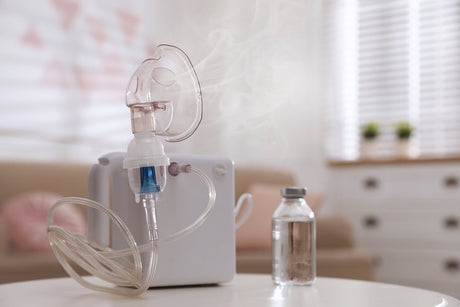If you have chronic obstructive pulmonary disease (COPD), you may notice that your symptoms get worse during the winter months. You may experience more coughing, wheezing, shortness of breath, and chest tightness. You may also be more prone to infections, such as colds, flu, and pneumonia.
Why does COPD get worse in winter? And what can you do to manage your condition and prevent complications? In this article, we will answer these questions and provide you with some tips and strategies to cope with COPD in winter.
What is COPD?
COPD is a group of lung diseases that cause airflow obstruction and breathing difficulties. The most common types of COPD are emphysema and chronic bronchitis. Emphysema damages the air sacs (alveoli) in the lungs, making them less elastic and less able to exchange oxygen and carbon dioxide. Chronic bronchitis causes inflammation and mucus production in the airways (bronchi), narrowing them and making it harder to breathe.
COPD is a progressive and irreversible condition that affects millions of people worldwide. The main risk factor for COPD is smoking, but other factors, such as air pollution, occupational exposure, genetic predisposition, and respiratory infections, can also contribute to its development.
Why is COPD worse in the winter?
There are several reasons why COPD in the winter months can seem worse. Some of them are:
Cold weather: Cold air can irritate the lungs and trigger bronchospasm, a sudden constriction of the airways that causes coughing and wheezing. Cold air can also reduce the amount of oxygen in the blood, making it harder for the lungs to work efficiently.
Dry air: Dry air can dry out the mucus membranes that line the respiratory tract, making them more susceptible to infection and inflammation. Dry air can also increase the viscosity of the mucus, making it harder to clear from the lungs.
Indoor heating: Indoor heating can create a warm and dry environment that can aggravate COPD symptoms. Heating systems can also circulate dust, allergens, and germs that can irritate the lungs and cause infections.
Infections: Winter is the peak season for respiratory infections, such as colds, flu, and pneumonia. These infections can cause inflammation and mucus production in the airways, worsening airflow obstruction and breathing difficulties. They can also lead to complications, such as acute exacerbations of COPD (AECOPD), which are sudden worsening of symptoms that require medical attention.
Reduced physical activity: During the winter months, people with COPD may tend to stay indoors more often and avoid physical activity due to the cold weather and fear of getting sick. However, physical inactivity can have negative effects on COPD, such as weakening the muscles, reducing lung function, increasing fatigue, and lowering mood.
How to manage COPD in winter?
The good news is that there are some steps you can take to manage your COPD symptoms and stay healthy during the winter season. Here are some of them:
-
Keep warm: This may seem obvious, but for COPD sufferers, it’s especially important to dress in layers and wear a scarf or a mask over your mouth and nose when going outside to protect your lungs from the cold air. Avoid exposure to extreme temperatures and wind chill. Keep your home at a comfortable temperature and use a humidifier or a vaporizer to add moisture to the air.
-
Avoid infections: Wash your hands frequently with soap and water or use an alcohol-based sanitizer to prevent the spread of germs. Avoid contact with people who are sick or have symptoms of respiratory infections. Get vaccinated against flu and pneumonia every year as recommended by your doctor. Take your medications as prescribed and follow your treatment plan. Shop for sanitizing products.
-
Stay active: Exercise regularly within your limits and under your doctor's guidance. Exercise can help improve your lung function, strengthen your muscles, boost your immune system, reduce stress, and enhance your quality of life. Choose activities that you enjoy and that are suitable for your condition, such as walking, cycling, swimming, or yoga.Learn more about exercise for those with COPD.
-
Eat well: Eat a balanced diet that includes plenty of fruits, vegetables, whole grains, lean proteins, healthy fats, and fluids. Avoid foods that can cause gas or bloating, such as beans, cabbage, broccoli, or carbonated drinks. These foods can make you feel short of breath by putting pressure on your diaphragm. Also avoid foods that can trigger or worsen reflux, such as spicy foods, chocolate, coffee, or alcohol. Reflux can cause acid to enter your lungs and irritate them. Read more about the right foods to eat for managing COPD.
-
Quit smoking: Smoking is the leading cause of COPD and one of the worst things you can do for your lungs. Smoking damages the lung tissue, increases inflammation, reduces oxygen levels, and impairs the immune system. Quitting smoking can slow down the progression of COPD and improve your symptoms and overall health. If you need help to quit smoking, talk to your doctor about the available options, such as nicotine replacement therapy, medications, counseling, or support groups.
- Seek help: If you notice any signs of worsening symptoms or complications, such as increased coughing, wheezing, shortness of breath, chest pain, fever, or sputum production, contact your doctor right away. You may need to adjust your medications or seek emergency care. Don't ignore or delay seeking help, as this can lead to serious consequences.
Managing COPD in winter
COPD is a chronic lung condition that can get worse during the winter season due to various factors, such as cold weather, dry air, indoor heating, infections, and reduced physical activity. However, by following some simple tips and strategies, you can manage your COPD symptoms and stay healthy during the winter season. These include keeping warm, avoiding infections, staying active, eating well, quitting smoking, and seeking help when needed. Remember that COPD is a manageable condition and you can live a fulfilling life with it.
FAQs
Q: Can I travel with COPD in winter?
Yes, you can travel with COPD in winter, but you need to plan ahead and take some precautions. Check with your doctor before you travel and make sure you have enough medications and oxygen (if needed) for your trip. Pack a copy of your medical records and prescriptions in case of emergency. Avoid traveling to places with high altitude or poor air quality, as these can worsen your symptoms. If you are flying, inform the airline about your condition and request special assistance if needed.
Q: How can I prevent AECOPD in winter?
AECOPD are sudden worsening of COPD symptoms that require medical attention. They can be triggered by infections, environmental factors, or medication changes. To prevent AECOPD in winter, follow the tips mentioned above to manage your COPD symptoms and avoid infections. Also monitor your symptoms regularly and use a peak flow meter or a COPD action plan to detect any changes. If you have any signs of AECOPD, seek help immediately.
Q: What are some home remedies for COPD in winter?
Some home remedies that may help ease your COPD symptoms in winter are:
- Drinking warm liquids, such as tea, soup, or honey and lemon water, to soothe your throat and loosen the mucus.
- Use saline nasal sprays or rinses to clear your nasal passages and reduce congestion.
- Gargling with salt water to reduce inflammation and infection in your throat.
- Using chest rubs or inhalers with menthol or eucalyptus to open up your airways and relieve coughing.
- Doing breathing exercises or using a device such as a spirometer or an incentive spirometer to improve your lung function and clear the mucus.
- Doing chest physiotherapy or using a device such as an acapella or a flutter valve to help you cough up the mucus.
However, these home remedies are not substitutes for medical treatment and should be used along with your prescribed medications and therapies. Consult your doctor before trying any home remedies and stop using them if they cause any adverse effects.
As a leading supplier of durable and home medical equipment (DME and HME), ApriaHome sources and distributes a wide range of treatment solutions, including assistive respiratory equipment and monitoring solutions.
We're here to support you as you work toward your improved health and well-being. We strive to meet your ever-evolving healthcare requirements with individualized attention and premium quality treatment solutions.
Looking to add respiratory supplies? Browse our premium solutions and let us help you get the most out of every day.
Looking for advice? Our helpful agents are on call at (800) 780-1508 between 8:00 am - 10:00 pm EST daily. Get in touch today..





